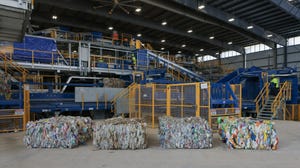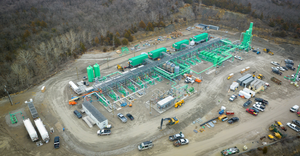Has Recycling Withered?
Think back to a decade ago. Recycling was hot. Most state legislatures had just established statewide recycling goals and, in one way or another, had required recycling at the local level. De-inking mills were all the rage in the paper industry. The plastics industry was busily promoting plastic recycling. Aluminum was riding a wave of glory with its significant recycling rate and the high value for aluminum cans. Everything looked rosy.
Today, the bloom is off recycling's rose. Many states have missed their mandated goals and either have done nothing about it or have lowered their goals. Several of the de-inking mills, built in the mid-'90s, have closed, although the paper industry itself has continued to enjoy ever-higher recycling levels. The plastics industry still is fending-off the anti-plastics crowd which insists, against the evidence, that plastic isn't recyclable. As for aluminum, its can recycling rate peaked in 1992, and the value of used beverage containers isn't as good as it used to be.
To add insult to injury, The Seattle Times greeted attendees at January's National Recycling Congress with a front-page story titled, “Recycling's Down in the Dumps.” The story was a fairly typical discussion of weak recycling markets and flat recycling rates. And it stressed the blow to recyclers' psyches caused by The New York Times' 1996 article, “Recycling is Garbage.”
I think it's time for recyclers to relax and accept the fact that not everyone loves recycling. Negative stories will appear in the press. The NY Times' article raised legitimate questions, despite its distortions. And besides, most people got their revenge on the author by recycling his story.
Recycling is like every other media phenomenon. After the first rush of enthusiastic stories and proactive legislation, the press and politicians move onto other issues. Nowadays, the media is indifferent to recycling stories. The recycling economic impact study released last November received virtually no press, nor did the more recent report on bottle bills or the counterattack by the soft drink industry. In the past several years, few recycling bills have been introduced, and even fewer have been passed because legislators don't sense any public interest. The recycling rate is flat because it has reached an inevitable plateau, and it probably will remain at its current level until someone invents a cheaper way to recycle.
Recycling is no different than any other cause. Eventually, the heat dissipates and the movement either stabilizes or withers away. The persistence of recycling programs shows how strongly they have insinuated themselves in our daily lives. True, we still need to remind people to recycle and why. But so what? Coca-Cola still needs to advertise, and fire departments still need to celebrate October as fire prevention month. Most Americans participate in recycling programs because they want to. They just need occasional reminders of when and how to recycle, just like they do about when and how to set out their garbage.
So relax, the bloom may be off the recycling rose, but the rose bush is stronger than ever.
The columnist is director, state programs for the Environmental Industry Associations, Washington, D.C.
Opinions in this column do not necessarily reflect the National Solid Wastes Management Association or the Environmental Industry Associations. E-mail the author at: [email protected].
About the Author(s)
You May Also Like




